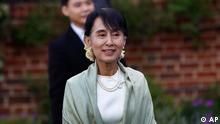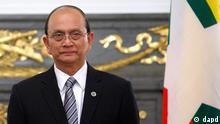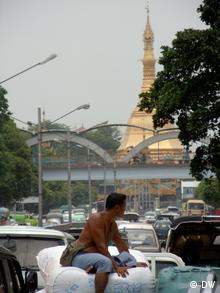Myanmar's democracy icon Aung San Suu Kyi has been told off by the country's electoral authorities for using the name 'Burma' to refer to the country. So, what really is in a name anyway?
In its rebuke, Myanmar's electoral commission began by referring to Suu Kyi by using the honorific prefix "Daw."
"Daw Aung San Suu Kyi called Myanmar 'Burma' in her speech to the World Economic Forum in Thailand on 1 June, 2012," it noted. "Again, Daw Aung San Suu Kyi called Myanmar 'Burma' in her speeches during her Europe tour."
The military government changed the name in 1989 as European place names across the Asian continent became ever scarcer. Three years earlier, the UN had started to use Chinese - resulting in a change from the Romanized Peking to Beijing.
Myanmar - said to be an ancient term referring to the central part of the country - was chosen to ostensibly better reflect the diversity of the nation's population - of which ethnic Burmans represent less than 70 percent. Some experts say this is false, and that the two terms have been used interchangeably for centuries.

Aung San Suu Kyi refers to her country as Burma
What's in a name?
The name of Burma's then capital, Rangoon, also became Myanmar's center of power, Yanyon - later usurped by a new capital, Naypyidaw, built at the behest of the generals.
However, Aung San Suu Kyi's National League for Democracy has taken exception to the renaming, saying that the regime had no mandate to make such a change.
"The dictatorship arbitrarily changed the name of the country and the democracy movement said they didn't have the right," director the Burma Campaign UK, Mark Farmaner, told DW.
"Personally, I am a little bemused by the amount of arguing that goes on about names when at the same time you have a country with such an appalling human rights record, but I have had people tell me that it really is important," said Farmaner, before adding that electoral authorities who criticized Suu Kyi did not have their priorities in order.
"The focus is all wrong. It should be cleaning up its own house and making sure that elections are free and fair, unlike the last two that took place there."
In his book, "Burma or Myanmar?: The Struggle for National Identity," Asia expert Lowell Dittmer from the University of California, Berkeley, explains that the "new" name Myanmar originates from a written, literary form.
Burma, on the other hand, was derived from the spoken form of the name in Bamar, the Burman ethnic language. It was adopted by the British during their colonial rule of the country between 1826 and 1948, and gained international usage. Burmese became the adjective for all the country's people, and is still widely used.

President Thein Sein's reforms have raised the question over the country's name once again
Dittmer defines countries that say Myanmar as "realists" who believe names can be used to exert pressure - and nominalists, who do not.
The argument runs that to use the name "Myanmar" is to sanction the denial of power to the country's opposition even after it won elections in 1990.
"Behind this apparently petty linguistic dispute, a battle has raged for national identity," said Dittmer.
"These two names have come to symbolize two quite different historical experiences and political trajectories, each upholding its claim to legitimacy."
Global confusion
Global leaders struggle with how to name the country, especially since reforms recently introduced by Prime Minister Thein Sein.
British Prime Minister David Cameron uses the name Burma, while recent speeches by US President Barack Obama also use the name.
But on a trip to the country late last year, US Secretary of State Hillary Clinton tended to dodge controversy by using the term "this country."
The name Burma continues to be used by many countries, including the United States, Canada and the United Kingdom. Meanwhile, the United Nations uses Myanmar, as do the Association of Southeast Asian Nations, China, Germany, India, Norway and Japan.
Brussels has found its own way to neatly sidestep the issue, calling the country Burma/Myanmar.
"Some countries within the EU call it Burma while others call it Myanmar," said EU spokeswoman Susanne Kiefer. "Although we have had that name for it for a while, it's something that has only recently been confirmed."
Burma Campaign UK's Farmaner maintains that an across-the-board change to Myanmar might be possible after more democratic reform is achieved.

Less than 70 percent of people in the country are ethnic Burmans
"Maybe at a later date, a democratically elected government might also change but the opposition is not going to accept it from a government that seized power by the barrel of a gun."
Setting priorities
Setting priorities
It's a debate that likely to take something of a back seat for Suu Kyi, who returned home from her historic trip to Europe to cheering crowds on Saturday.
Balancing the need for economic development against the maintenance of external pressure on the government is likely pose a more immediate challenge.
With only a tiny fraction of seats for the National League For Democracy in a parliament dominated by the successor party to the pro-military junta, changing the naming of the country - or keeping it the same - looks to be a long way down the line.
Author: Richard Connor
Editor: Sarah Berning
Editor: Sarah Berning



 ڈيرہ غازي خان: چند روز قبل احسان الله نامي شخص کو جرگے ميں کارو قرار دے کرفوري علاقہ بدر کا حکم ديا گيا تھا، جرگہ ذرائع
ڈيرہ غازي خان: چند روز قبل احسان الله نامي شخص کو جرگے ميں کارو قرار دے کرفوري علاقہ بدر کا حکم ديا گيا تھا، جرگہ ذرائع 


0 comments:
Post a Comment